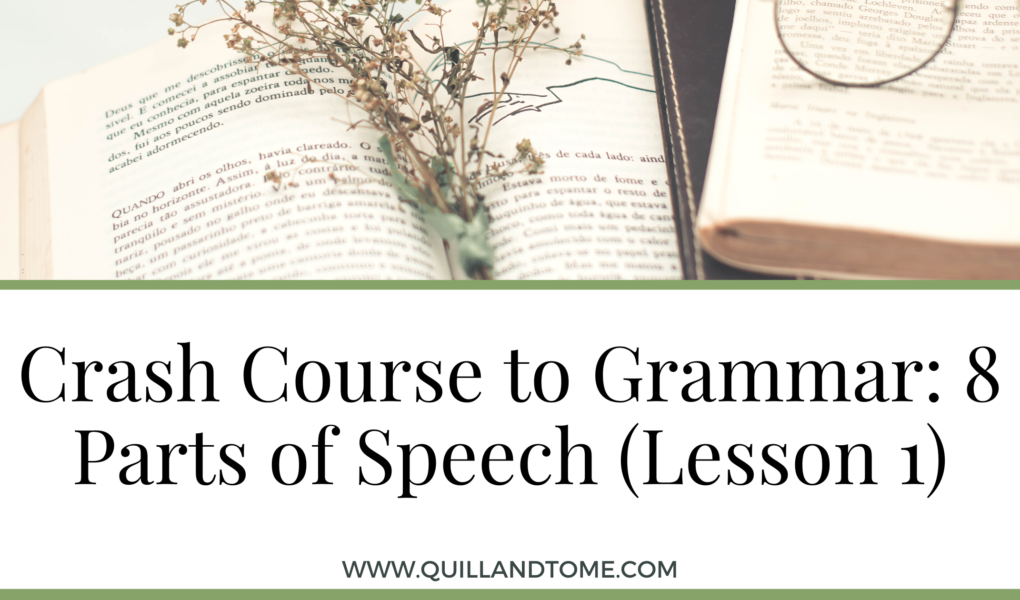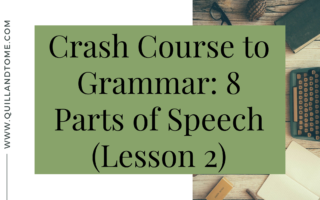Welcome to the Crash Course in Grammar Series: The 8 Parts of Speech!
One part of being a good writer is having a good understanding of language and grammar. You don’t necessarily need a master’s degree in English to write well, however you do need to understand the uses and functions of the different parts of speech.
Nouns and pronouns make up the first two parts of speech on this list. They are the backbone of the English language, and are usually the first words that you learn to say. As a baby, you begin to speak by naming things, “Mama”, “ball”, “dog”. Once you have developed a sizable vocabulary made up of nouns, you begin adding verbs and the other parts of speech. As time goes on, you learn that the same word can function as different parts of speech depending on how it is used in the sentence. Knowing the word’s function will help you construct grammatically correct sentences, regardless of what you are writing.
Nouns
A noun is a person, place, thing, or idea. There are several types of nouns that all have their own individual functions.
Singular
A noun that names a single person, place, thing, or idea
Ex. boy, house, apple
Plural
A noun that names more than one person, place, thing, or idea, usually by adding an ‘s’
Ex. boys, houses, apples
Collective
A noun that refers to a collective of people, places, things, or ideas
Ex. family, neighborhood, bushel
Concrete
A noun that you can learn about through at least one of your 5 senses
(taste, touch, smell, sight, and hearing)
Ex. book, pen, phone
Common
A noun used to name a person, place, thing, or idea in general
Ex. car, girl, restaurant
Abstract
A noun that you cannot see, taste, hear, smell, or touch. It is an idea, and event, or a feeling
Ex. love, interview, headache
Proper
A noun used to name a specific person, place, thing, or idea. A proper noun always starts with a capital letter.
Ex. Mercedes Benz, Anne, Applebee’s
Pronouns
A pronoun is a word that takes the place of a noun.
The different types of pronouns are determined by which word they replace.
Subjective
A pronoun that takes the place of the subject of a sentance
I, You, He, She, It, We, They
Examples:
I washed the car.
She read her biology book.
They sang in the choir.
Objective
A pronoun that takes the place of the direct or indirect object of a sentance
Me, You, Him, Her, It, Us, Them
Examples:
Mom took him to the doctor.
Lisa gave us the tickets.
Mark built the house for them.
Possessive
A pronoun that shows something belongs to a particular person
My/Mine, Your/Yours, His, Her/Hers, Its, Our/Ours, Their/Theirs
Examples:
Mom washed her clothes.
These are our books.
Your purse is gorgeous!
CHECK OUT THE WRITER’S PLANNER BY QUILL AND TOME!
Get the planner and organize your life and your writing!
What you can find inside:
- Plenty of writing space in a vertical layout
- Undated weekly and monthly pages you can start using any day of the year
- Reading and Writing Trackers
- Writing Tips
- and so much more!
Intensive Pronouns
A pronoun that emphasizes the noun that the pronoun refers to in the sentence. They always end with “self” or “selves”.
Examples:
My daughter tied her shoes herself.
You need to fix the sink yourself.
The ring itself is made of white gold.
Reflexive
An intensive pronoun which refers back to itself. The meaning of the sentence changes if you take the reflexive pronoun out of the sentence.
Examples:
Logan and I bought ourselves chocolate at the show.
I made myself a cup of coffee.
He made dinner for himself.
Over To You
I hope this helped you make some sense of nouns and pronouns. Check out the other posts in the series for the rest of the parts of speech, and let us know about your grammar troubles!
If you enjoyed this content and are interested in fitting writing into your daily life, DOWNLOAD THE FREE WORKBOOK! Read our monthly newsletter, full of valuable writing advice and be the first to know when we release a new product or book.








[…] Last week we talked about nouns and pronouns, which are the basic building blocks of language. This week, we will be talking about verbs […]